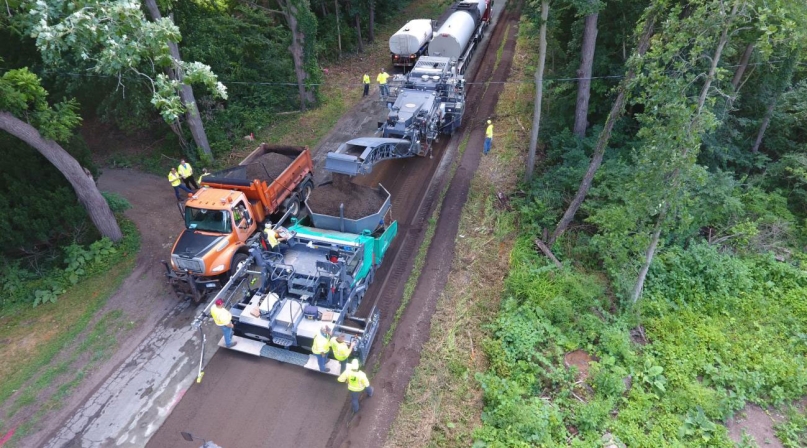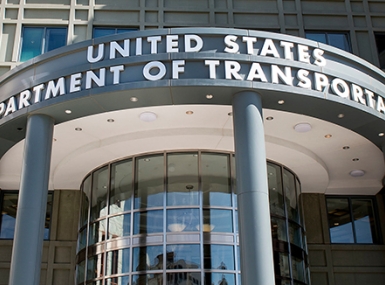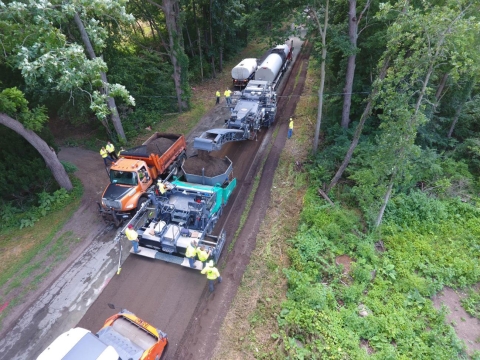Problem:
|
Inadequate funding for road improvements has left county roads in poor conditions.
|
Solution:
|
Establish a road recycling program that creates durable roads and reduces the costs of traditional construction work.
|
In Jackson County, Mich., county roads are being revamped from the bottom up.
The Jackson County Department of Transportation Road Recycling and Improvement Program is a large-scale approach to improve the condition and durability of the county’s 1,600-mile road system.
Christopher Bolt, who heads up Jackson County Department of Transportation, explained that Michigan has seen declines in road funding.
Learn More
With dwindling resources and costs rising to repair roads that are falling apart, many projects were unable to be completed.
There are two classifications of roads in the county which are “county primaries” and “county locals,” he noted.
As of 2018, half of the county primaries needed major work that would cost $300,000 to $400,000 per mile. Out of the 1,000 miles of county local roads, 800 miles needed a full reconstruction.
An estimated $300 million to $400 million investment would be needed to repair all the roads in the county.
The department took a two-pronged approach to find a solution: Save the roads that could be preserved and rebuild the roads that needed it.
“While we have this huge challenge, it’s a once-in-a-lifetime opportunity to change the way the roads are constructed [and] to build them in a more durable fashion,” Bolt said.
The county invested $6 million and purchased “cold-in-place” recycling equipment that is used to grind up existing asphalt roads, blend it with binding agents and place it back down as a new road base.
The equipment includes the Wirtgen CR 3800 recycler, the Wirtgen KMA 220i stationary recycling plant, supporting pieces of equipment, a lab to develop mix designs and a ground-penetrating radar vehicle with scanning equipment.
Average county local roads have between 3.5 and 5.5 inches of asphalt as the top layer with gravel as the base, he said, adding that when climates change, the gravel base is comparable to a sand castle that washes away with the waves.
Through the road recycling and improvement program, a recycled base is used to build roads from the bottom up.
The base is tested in a laboratory and the mix is designed with binding agents. Bolt said the recycled base is nearly as strong wet as it is dry and because of its durability, crews only uses 2 inches to 3.5 inches of asphalt on top of roads, saving money on projects.
“It just builds a more durable base where we’re not wasting time and money patching potholes, which helps improve the safety of our roads and the quality of life of our residents and visitors,” he said.
It only takes one to two days to recycle an entire road that may have some slight curves, Bolt said. He described the process as similar to rototilling a garden.
Road recycling can help reduce and delay cracking, create stronger roads and reduce costs in traditional construction methods.
“We’re chasing our tails with taking care of roads that are falling apart,” Bolt said.
“It creates a sense of helplessness from the people side of things to just be patching the same pothole that you patched two weeks ago.”
The county did extensive research before purchasing its equipment, including talking with a contractor who was recycling roads in Florida, meeting with the Ministry of Transportation in Ontario, Canada and speaking with the Alaska Department of Transportation to see the sustainability of recycled roads in colder climates.
“We were the only one in the U.S. that we know of, possibly even the world, that run and own a full comprehensive recycling road program,” Bolt said. “There are some municipalities that might own one or two pieces of equipment, otherwise they’re just hiring contractors to do a road here or there.”
Twelve miles of roads were recycled in 2018 in Jackson County and over 50 miles are planned to be completed in 2019 with 50 to 80 miles planned each additional year.
Through the program, taxpayers are estimated to save $125 million over the next 50-plus years.
Not all communities have the right circumstances where a road recycling program is efficient, Bolt said. Counties need to have a certain infrastructure system, a dedicated workforce to operate the equipment and support from the county board of commissioners. He said for different regions of the country with primarily concrete roads, the program would not be a consideration.
“We’re trying to tell people through our pilot work and our road system that this technology can do great things and it can be economical,” he said.
The department is looking at other innovations including a program to incorporate waste plastics in asphalt.
“Our culture is one of continuing to explore ways to build better roads including the incorporation of recycled waste plastics as an additive in the hot mix asphalt that’s used on top of our roads,” Bolt said.





